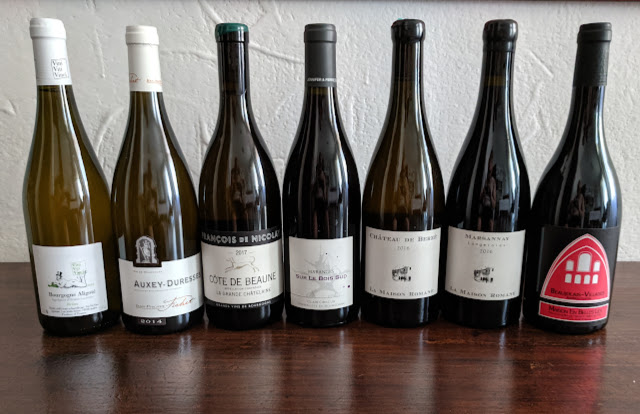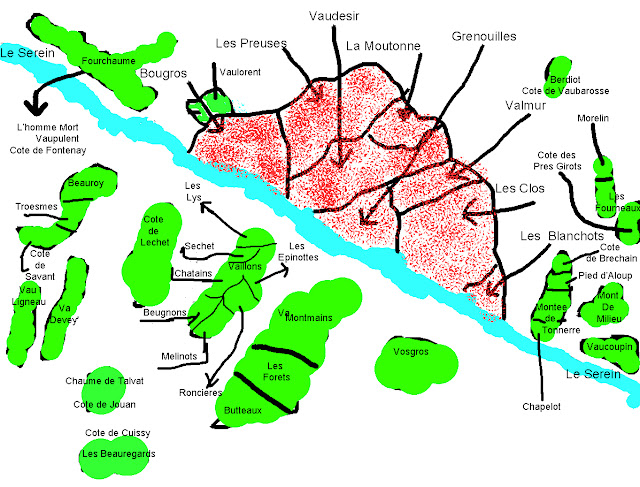La Bourgogne en feu
Lately we
did intense research on Burgundy, due to the value of this region becoming very
expansive. We research new producers and old friends, and also wines made in
part of this region less know or less attractive by the big money, but with
awesome terroir.
Oronce de
Beler from La Maison Romane arrived in Burgundy in 2004. He did a degree in
winemaking in Beaune settled in this old Roman house in the village of Vosne
Romanee with the help of two horses Prosper and Quarto they working together in a different parts of Burgundy. Oronce he does not use chemicals and follows the principles of
biodynamics to respect and farm his terroir. He vinifies following the phases
of the moon and working by gravity at all times, without any mechanical
pumping.
The wine we
choose from Maison Romane
2016 Marsannay “Longeroies”
Beautiful translucent color with soft red fruit and floral touches. Spicy notes ginger and star anise,
toasted almond with slightly balsamic touches. On the palate, it is soft and fresh, with pleasant tannins and a discrete long finish, lots of energy with a savoury touch, slightly floral, mineral and bitter finish.
2016 Macon “Chateau de Berze”
Aromas of golden apple and nashi pear, together with crust cheese and herbaceous touches. On the palate, it is voluminous with a tension slimmer acidity.
François de
Nicolay in Burgundy he manages Domaine Chandon de Briailles with his sister
Claude. In 2000 he decided to start a small-scale, high-quality negoce business
producing 15,000 bottles in Savigny-Lès-Beaune.
Having seen
the benefits of biodynamic viticulture at his family Domaine, François only
sources organic or biodynamic grapes from trusted friends amongst the best
growers, who are sometimes famed producers themselves. The optimal quality of
the grapes means he can create several cuvées without added sulfites or
chaptalization; other cuvées experience an extremely low dose of sulfur as the
only addition. François lets the terroir express itself with this minimal
intervention, use of natural yeasts, and neutral barrels. The wines receive the
utmost care: they do not undergo either pumping or filtration and they are hand
bottled with a "Chèvre a Deux Becs" directly from the barrel.
The wine we
choose from Francois de Nicolay
2017 La Grande Chatelaine Cote de Beaune
Gloden color, mineral notes as wet rocks, flaky salt element, hints of white buttons mushroom. Great energy and richness on the palate. Quite a long finish
Jean
Philippe Fichet in Mersault is devoted, farmer, He is known to be the expert of
bringing out the very best from village level ‘Lieux Dits’; with his meticulous
viticulture and mastery of long élévage, he is able to fashion complex, age-worthy wines from these sites that put most people premier cru wines to shame. Fichet
has 7 hectares of vines, split across 18 different parcels. The majority are in
Meursault, but there are smallholdings in Monthelie, Auxey-Duresses and
Puligny-Montrachet. With a small winery, he used a mix of barrels of 500
liter demi-muids and 225 liter barriques, and 30% new oak is used each year.
The wines initially spend a year in oak and then they are given another 6
months on top of this after racking. Every single wine is treated the same.
Jean
Philippe is a belief in severe winter pruning rather than green harvesting.
The wine we
choose from Jean Philippe Fichet is
2014 Auxey
Duresses
The small Domaine Clair Obscur is located
in Corpeau, a town bordering Puligny-Montrachet and Chassagne-Montrachet, in
the Côte de Beaune.
The connection between
the Clair family and the wine began in 1962, the year in which the first vines
were planted; in 2006 then, Viviane and Guy Clair took over the family
production and, also on the advice of their son Pierre, a leading figure of the
famous Domaine De Montille, they decided to relaunch the Domaine and focusing
on natural wines.
Today they work
with aligoté, pinot noir and chardonnay and the production philosophy are based
on the respect for nature; viticulture is in fact natural, does not involve the
use of synthetic chemicals and the vinification, is carried out without any
treatment.
They aim for the
maximum purity of aromatic expression and try to give voice to the terroir.
The wine we
choose from Domain Clair Obscur
2017
Maranges Sur le Bois Sud
Maison en
Belles Lies by Pierre Fenals, the name derives from a practice developed by
17th century monks who would dry their barrels and rub them with the lees from
the vintage.
Pierre makes
pure, traditional sense of place wines, located in Saint-Aubin and he now also
rents and owns vines in Santenay, Monthelie, and Corton including a plot of Le
Corton itself. Also, some negociants grape are chosen but only in natural
farming from his friends. He start In 2002 and he purchased his first 2.5
hectares of vines in Maranges and in the Haute Côtes de Beaune.
The wine we
choose from Pierre
2017
Beaujolais village
this a truly glou glou "Vin de Soif"
Vini Viti
Vinci by Nicolas Vauthier, he has been on the forefront of promoting the wines
he loves for many years. He had a long career working in wine, starting at
retail wine in France, where he soon discovered the wines that would become his
real passion. After that he helped open Aux Crieurs de Vins, a natural
wine bar in Troyes in Champagne. He worked with Philippe Pacalet, he start his
own micro-negociant winery in 2009.
Today Kikro
works exclusively with the less desired appellations of Northern Burgundy,
including Chitry, Irancy, and Epineuil, working with Pinot Noir, Chardonnay and
Aligoté. The reds are made entirely with whole bunches and carbonic maceration
followed by brief elevage times for softening in barrique, like he learned to work with Pacalet. The result is extremely quaffable and delicious pinot
noir, with a lot of finesse.
The wine we
choose from Nicolas
2017
Aligote Breau
Mineral, drinkability with great tension ...
Best
raffaele mastrovincenzo
wine / spirit / lambic / drinker










Comments
Post a Comment